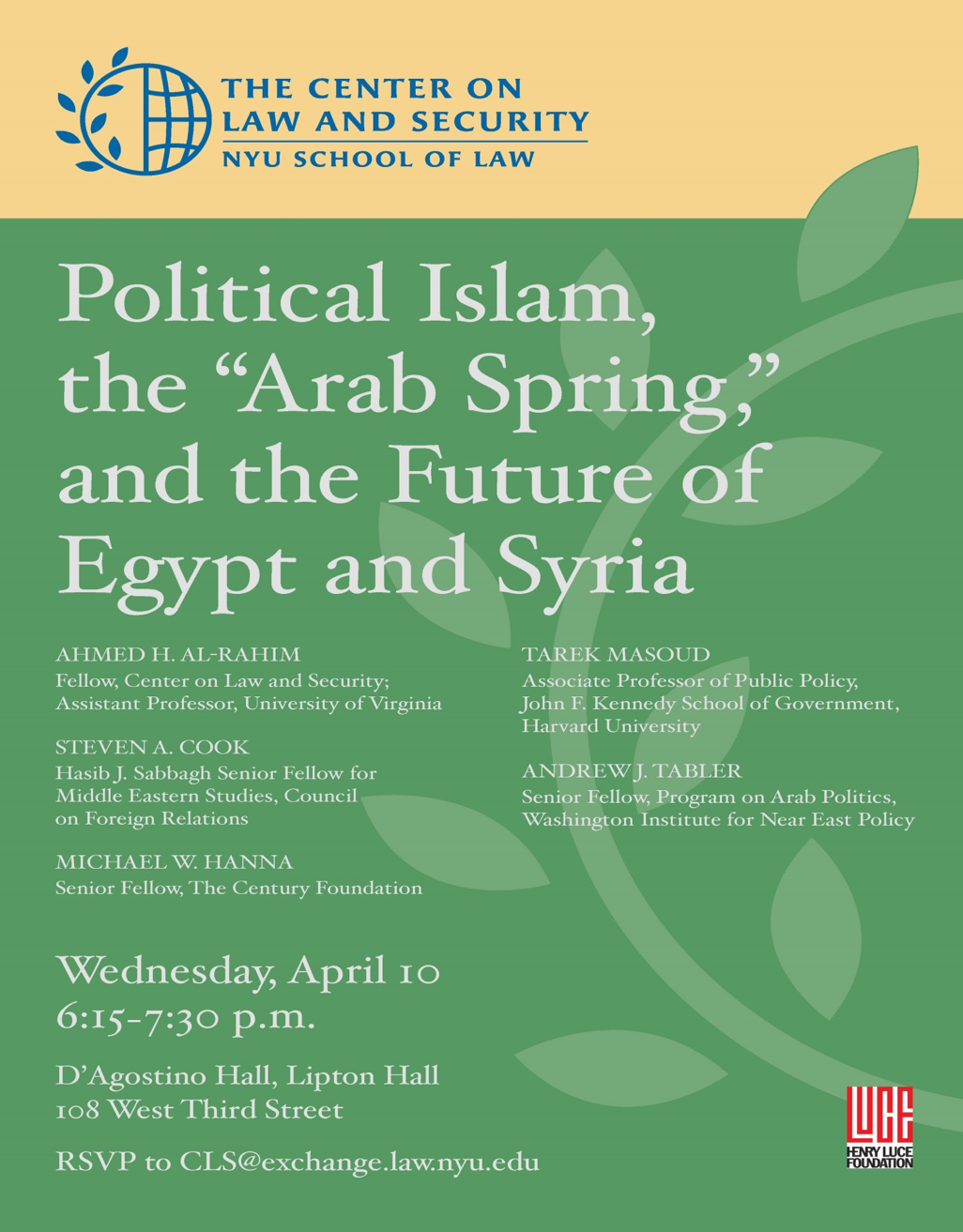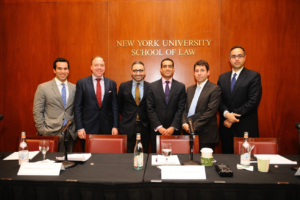
- This event has passed.

Political Islam, the “Arab Spring,” and the Future of Egypt and Syria
April 10, 2013 @ 2:15 pm - 3:30 pm
In the aftermath of the “Arab Spring” Islamist political parties came to control several Middle East countries, and important elements of the Syrian opposition. It is, nonetheless, not clear whether or to what extent religious doctrine, as opposed to secular considerations, is responsible for their foreign policy choices. This event will explore the factors that are motivating Islamist political parties in Egypt and Syria, particularly the Muslim Brotherhood. It will also explore how the Brotherhood in Egypt has fared since it took power, and how its sister group in Syria sees a post-Assad future for the country. It will also consider how the United States should respond to these developments, and specifically to the ascendance of Islamist political parties in the last several years.
The video of this event is available, click here to watch.
Ahmed al-Rahim (Ph.D., Yale University) is a visiting CLS Fellow and an assistant professor at the University of Virginia, where he teaches Islamic studies in the Department of Religious Studies. His work centers mainly on the medieval intellectual traditions of Islamic civilization (particularly the transmission of Arabo-Islamic philosophy, medieval biography, and virtue ethics). Dr. al-Rahim is currently working on a monograph, titled Political Islam: Medieval Theology, Modern Ideology, which examines the ways in which elements of medieval Islamic law, theology, and history are—often through historical memory—fused with the modern (post-Napoleonic invasion of Egypt in 1798) ideological programs of political Islam; among which are those of modern Salafism, the Muslim Brotherhood, political Shi’ism, and most recently Jihadi-Salafism.
Steven A. Cook is Hasib J. Sabbagh senior fellow for Middle Eastern studies at the Council on Foreign Relations (CFR). He is an expert on Arab and Turkish politics as well as U.S.-Middle East policy. Dr. Cook is the author of The Struggle for Egypt: From Nasser to Tahrir Square (Oxford University Press, Fall 2011), which won the Washington Institute for Near East Policy’s gold medal for best book on the Middle East in 2011, and Ruling But Not Governing: The Military and Political Development in Egypt, Algeria, and Turkey (Johns Hopkins University Press, 2007).
Michael Wahid Hanna is a senior fellow at The Century Foundation. He works on issues of international security, international law, and U.S. foreign policy in the broader Middle East and South Asia. He recently served as a co-director of The Century Foundation’s International Task Force on Afghanistan, co-chaired by Thomas Pickering and Lakhdar Brahimi. He has published widely on U.S. foreign policy in newspapers and journals, including articles in the New York Times, the Los Angeles Times, the Boston Globe, Christian Science Monitor, the New Republic, and World Policy Journal, among other publications, and is a frequent contributor to Foreign Policy.
Tarek Masoud is an associate professor of public policy at Harvard University’s John F. Kennedy School of Government. A political scientist and the Middle East specialist, his research focuses on political development in countries that are poor and unfree. He is particularly interested in the processes by which governments become more accountable to, representative of, and responsive to the needs of their people. He is the author of a forthcoming book on Islamic political parties, and is the co-editor of Problems and Methods in the Study of Politics (Cambridge, 2004) and Order, Conflict, and Violence (Cambridge, 2008), and his articles and reviews have appeared in the Journal of Democracy, Middle Eastern Law and Governance, Foreign Policy, and the International Journal of Middle East Studies, among others.
Andrew J. Tabler is a senior fellow in the Program on Arab Politics at The Washington Institute for Near East Policy, where he focuses on Syria and U.S. policy in the Levant. The cofounder and former editor-in-chief of Syria Today, Syria’s first private-sector English-language magazine. Mr. Tabler achieved unparalleled long-term access to Bashar al-Asad’s Syria. During fourteen years of residence in the Middle East, Mr. Tabler served, most recently, as a consultant on U.S.-Syria relations for the International Crisis Group (2008) and as a fellow of the Institute of Current World Affairs (2005-2007), writing on Syrian, Lebanese, and Middle Eastern affairs. Upon completion of his graduate studies in 1994, he obtained editorships with the Middle East Times and Cairo Times; Mr. Tabler became senior editor and director of editorial for the Oxford Business Group (OBG) in 2000. The following year, he personally oversaw with OBG the first comprehensive report on Syria in more than thirty years.


